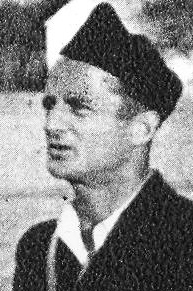Vicko Krstulović
| Vicko Krstulović | |
|---|---|

Vicko Krstulović during World War II.
|
|
| 3rd President of the Presidium of the Croatian Parliament | |
|
In office February 1952 – February 1953 |
|
| Prime Minister | Vladimir Bakarić |
| Preceded by | Karlo Mrazović |
| Succeeded by | Zlatan Sremec (as Speaker of Parliament) |
| Minister of SR Croatia Internal affairs | |
|
In office April 1945 – January 1946 |
|
| Minister of Labour | |
|
In office January 1946 – February 1951 |
|
| Personal details | |
| Born |
27 April 1905 Split, Dalmatia, Austria-Hungary |
| Died | 28 September 1988 (aged 83) Split, Croatia, Yugoslavia |
| Nationality | Croat |
| Political party | League of Communists of Yugoslavia (1922-1988) |
| Awards | People's Hero of Yugoslavia |
| Military service | |
| Allegiance | Yugoslavia |
| Service/branch | Yugoslav Partisans |
| Years of service | 1941-1944 |
| Rank | Major general |
| Battles/wars | Yugoslav Front |
| ^b The President of the Presidium of the Parliament was the office of the head of state, the Speaker of Parliament was a separate office. | |
Vicko Krstulović (27 April 1905 – 28 September 1988) was a Croatian Yugoslav revolutionary, military commander and politician from Dalmatia. He was an illegal communist activist during the 1920s and 1930s in Split at a time when communist sympatizers were brutally persecuted by the Yugoslav monarchy. As an officer in the Yugoslav Partisans during World War II, he was in charge of creating and organising the resistance movement in Dalmatia. In Federal Yugoslavia, he worked in various government offices and was remembered for his work and contribution to his native Split.
Vicko Krstulović was born on 27 April 1905 in Split during the former Austria-Hungary empire. He was born to a labour family. His father worked in the Split fields as an agriculturist. Vicko was introduced in politics thanks to his father who was a social democrat. His father was the first person to carry the red flag during the Labour Day parade in Split.
When his father was mobilised for World War I, Vicko was forced to carry on his work in the fields. His father returned from the war with an illness which prevented him from doing hard work. At that time, Vicko would hide people in his fields that escaped mobilisation to the war. Vicko like most Split residents supported the Kingdom of Serbia and was a fierce opponent of the Austria-Hungary empire which ruled Dalmatia with repression.
After the war, Vicko expected much from the newly formed Kingdom of Serbs, Croats and Slovenes but it proved to be a disaster. In 1919, the Communist Party of Yugoslavia was founded and Vicko was attracted by its ideas. In 1920, after the Communists won a large number of the city's in the local elections, the government banned them from acting legally and they became a forbidden party.
...
Wikipedia
